 Founded in 1993 by a French musician, Antonin Maurel, and a Spanish clown, Tortell Poltrona, Clowns Without Borders (CWB)—Clowns Sans Frontières, CSF—is an international non-profit organization (based in Paris, with offices in nine countries) that brings together performance artists with a passion for spreading cheer to children in need. Performing in refugee camps, slums, orphanages, and even prisons around the world, CWB’s entertainers improve the lives of children by bringing them joy, infectious laughter and the enjoyment of an all-round “extraordinary” day. As Sébastien Bris, Project Manager for CWB, says: “Finding the vocabulary to explain what we do isn’t easy… We even invented an expression to describe ourselves: an artistic organization for international solidarity.”
Founded in 1993 by a French musician, Antonin Maurel, and a Spanish clown, Tortell Poltrona, Clowns Without Borders (CWB)—Clowns Sans Frontières, CSF—is an international non-profit organization (based in Paris, with offices in nine countries) that brings together performance artists with a passion for spreading cheer to children in need. Performing in refugee camps, slums, orphanages, and even prisons around the world, CWB’s entertainers improve the lives of children by bringing them joy, infectious laughter and the enjoyment of an all-round “extraordinary” day. As Sébastien Bris, Project Manager for CWB, says: “Finding the vocabulary to explain what we do isn’t easy… We even invented an expression to describe ourselves: an artistic organization for international solidarity.”
According to Agnès Comte, spokesperson for CWB, the organization has the operational know-how necessary to back up its ambitious project. Today, CWB is the only organization dedicated to offering live performances and psychological support to people in need by combining the unique tools of cultural diplomacy, entertainment and good humor. From Sudanese refugees to hurricane survivors in Guatemala, CWB brings out the incredible dynamism and energy of children and communities through participation in spirited clown and circus performances, workshops and training sessions.
Although CWB’s programs primarily target the world’s most marginalized children, their animations strongly encourage the inclusion of all members of the community. “Everybody has a right to our performances!” insists Sébastien Bris. “If we’re putting on a show in Myanmar, it will be mainly for ethnic minorities, but, of course, Burmese children are welcome to attend.”
A brief history
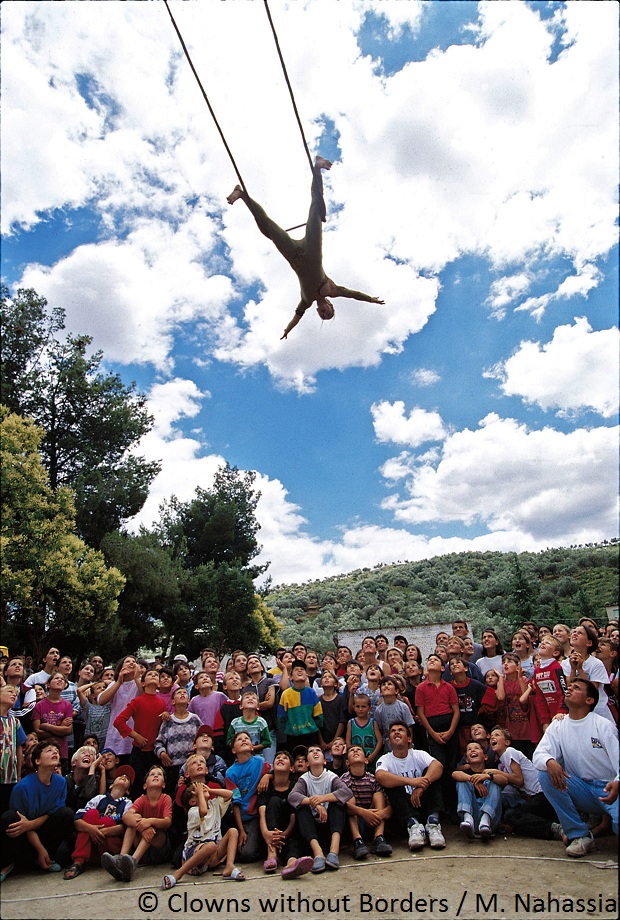 It was the curiosity of children that led to the creation of Clowns Without Borders. In the 1990s, a Spanish clown, Tortell Poltrona, began a globetrotting adventure—performing for children and students in schools around the world. Some of the children he met asked why he didn’t take his show to the region of ex-Yugoslavia—which, at the time, was a conflict zone torn apart by the atrocities of war—where the children could tremendously benefit from the gaiety of a clown performance. Tortell Poltrona took this suggestion to heart and later organized numerous shows in the region. Upon returning to Spain, he founded a small troupe with whom he travelled back to the region on several occasions to lift morale amongst the communities through clown performances.
It was the curiosity of children that led to the creation of Clowns Without Borders. In the 1990s, a Spanish clown, Tortell Poltrona, began a globetrotting adventure—performing for children and students in schools around the world. Some of the children he met asked why he didn’t take his show to the region of ex-Yugoslavia—which, at the time, was a conflict zone torn apart by the atrocities of war—where the children could tremendously benefit from the gaiety of a clown performance. Tortell Poltrona took this suggestion to heart and later organized numerous shows in the region. Upon returning to Spain, he founded a small troupe with whom he travelled back to the region on several occasions to lift morale amongst the communities through clown performances.
In France, Tortell Poltrona’s comical counterpart was not a clown but a musician, Antonin Maurel. A family affair at first, CWB only began to include other artists after several years. As the organization grew, it was able to raise more funds and share more of its uplifting performances. In 1998, CWB hired its first paid employee, who greatly helped to develop the scripts for the shows. Later, in 2001, the organization was also able to broaden its repertoire to include theater, music, dance and street art.
CWB’s activities gained further momentum when the organization hired a second employee in 2005, enabling it to extend its outreach to the general public and to attain broader global publicity of its activities.
Today there are three full-time employees at CWB, whose work is supported by a large team of volunteers, including 450 professional clowns, jugglers, dancers, acrobats, actors, puppeteers, musicians and various other connoisseurs of the imagination.
Interview
W4: We understand that your projects are launched in three different ways: either an organization contacts you directly and asks you to intervene; or you are struck by a difficult situation abroad and decide to go yourselves; and you also organize what you call reconnaissance trips. Can you tell us how the different missions come about, and describe some of your previous projects?
Sébastien Bris: Well, we have two types of projects. First, missions for refugees. These entail travelling to refugee camps to give performances or conduct workshops for children. Then, we also work with street children. For this type of project, we usually return frequently to a particular country, and we make sure that our artists maintain an ongoing relationship with the NGO that hosts us. That’s the case in Cairo or India, for example.
As for the reconnaissance missions, they’re systematic. When an NGO contacts us, we make a trip to the field and bring our expertise to the situation at hand. If we see that there are already lots of artists around, we do not get involved, since we aim to go where we’ll be most useful. But we also meet local artists who are interested in learning European-style puppetry, dance or music.
When we do decide embark on a project, we choose a theme that allows both French and local artists to work together. Local artists can’t always practice their art for a living and often live under extremely difficult conditions. That’s why the local artists receive payment throughout the duration of the performance, whereas their French counterparts work on a volunteer basis. Our task is to design workshops and performances for children, but also for educators as well. And at the same time, we try to build ties with the local population.
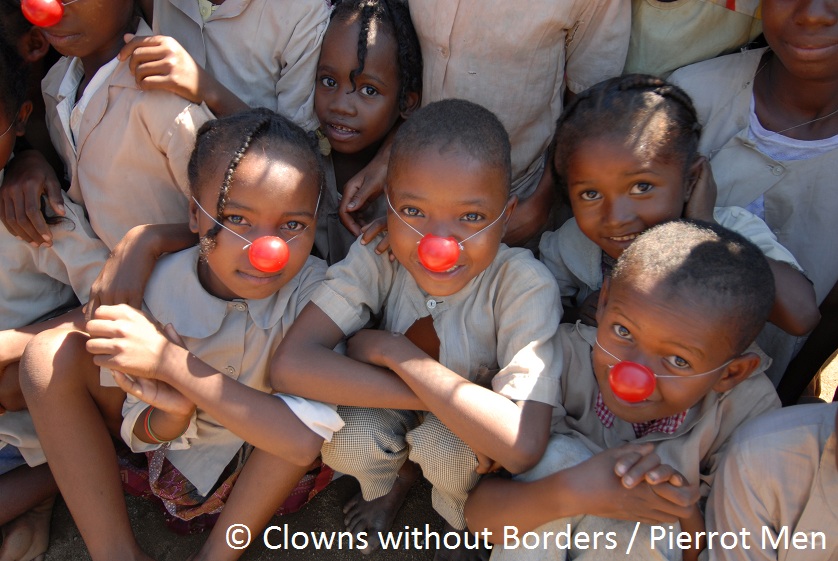 When we visit a refugee camp, we really focus on performances. We aspire to create a moment “outside of time”, a special moment that draws children out of their day-to-day existence.
When we visit a refugee camp, we really focus on performances. We aspire to create a moment “outside of time”, a special moment that draws children out of their day-to-day existence.
We especially try to get involved in countries that are often overlooked by the press. We visit refugee camps that people don’t hear much about. Once we’ve chosen the location, an artistic director and a logistical director make a trip to the field and decide whether we should set up a project. When the project is approved by our organization’s management, we work on the script for the performance and work to raise funds to finance the project.
Last year and the year before, we organized 9 different shows and approximately 15 field missions. We went to the Philippines, Thailand, Egypt, Moldova, Congo, Chile, Uruguay and South Africa. A total of a 127 artists took part, including 51 French artists. The others were either local artists or artists from other countries.
W4: Every mission is a unique and exceptional event for a Clowns Without Borders actor. Can you tell us about current and future projects?
Sébastien Bris: Next year, we’re going to Thailand, India, the Philippines, Uruguay, Congo and Egypt. Each destination presents its own challenges.
In some contexts, we’ll be focussing on performances for street children. We will go on tour in Egypt, commence a field evaluation mission in India, and will go “location scouting” in the Philippines.
As far as our work with refugee populations is concerned, we’ve decided to visit every single camp in Thailand. We had already visited some camps, but we’ve never visited all of them before. In Uruguay, we’re mainly going to offer support for local artists. The two French artists on assignment will help with the logistics of the tour, but the project has been mainly organized and financed by Uruguay: we’re only attending as guests.
We’re still busy writing and organizing our Congo project, so next year we’re mainly going to prolong this year’s shows and projects or finish current ones.
W4: What are your main challenges during your visits to perform for or work with children?
Sébastien Bris: Security. In war zones, for instance, we’re hosted by local NGOs and are subject to their security procedures. We must comply with the regulations of the host NGO.
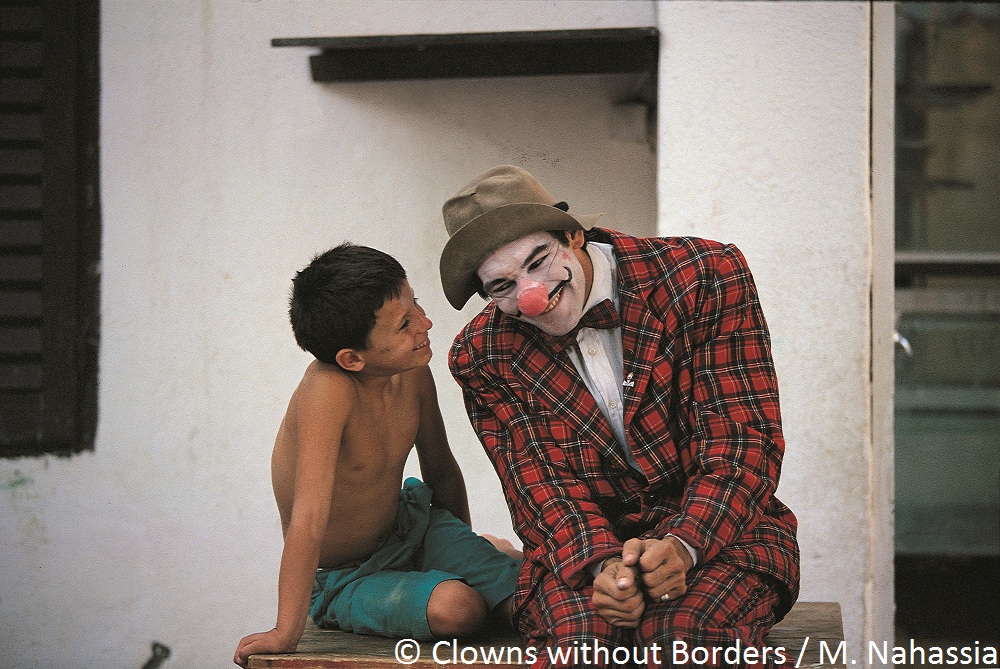 Cultural differences can also be challenging. It’s impossible to fully understand a country’s culture and, although we try to be as culturally sensitive as possible, sometimes it’s hard to figure out the appropriate decisions to make. In putting on our shows, of course we try to avoid anything that might offend local sensibilities. That’s a big artistic challenge and it mainly falls to the local artists to help us avoid potential pitfalls.
Cultural differences can also be challenging. It’s impossible to fully understand a country’s culture and, although we try to be as culturally sensitive as possible, sometimes it’s hard to figure out the appropriate decisions to make. In putting on our shows, of course we try to avoid anything that might offend local sensibilities. That’s a big artistic challenge and it mainly falls to the local artists to help us avoid potential pitfalls.
Sometimes we run into administrative difficulties. We’re not legally registered in all the countries where we operate and it’s not always easy to obtain the requisite permits. Normally, the host NGO takes care of such matters, but for some countries we need special visas.
We also face financial challenges. It’s an ever-present problem: raising sufficient funds to finance our performances.
We also need to ensure that we do not incur problems or put pressure on our work partners. For example, a performance celebrating freedom can be perceived as subversive in a dictatorship and our host NGO might run into problems as a result. The question of context and cultural difference is ever-present in our minds. Despite taking precautions, we’ve had some of our artists imprisoned. In Rwanda, one of our musicians was arrested on December 31, 2006 and died as a result of police brutality. For security reasons, we no longer visit Rwanda. But that’s really an extreme, and, fortunately, a highly exceptional situation.
W4: What are the day-to-day challenges you experience within the organization?
Agnès Comte: The greatest challenge is financial; raising adequate funds. As a result of public budget cuts, we receive less public funding and we are obliged to seek funding solutions elsewhere, which isn’t easy.
In the past, our Board was not very active in terms of fundraising. We would submit project proposals, which the board would accept, and everything functioned quite smoothly. Owing to our current financial challenges, we’ve really had to encourage the Board to be more actively involved in the organization, to become more dynamic in addressing challenges that face the overall organization.
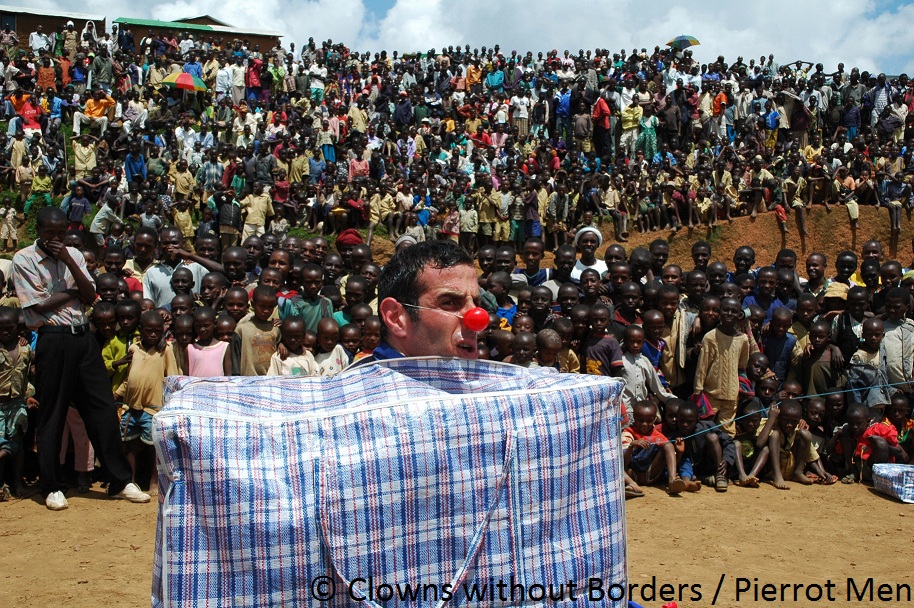 Another challenge is raising awareness about our specific work and the necessity of our work. When we ask people what the name Clowns Without Borders conjures up for them, they say the name is familiar but their understanding of our mission is vague. People know our work involves clowns and they get the idea of “without borders.” But the reflex response is to think that we are a troupe that visits hospitals or schools, a little like Médecins Sans Frontières. So our name is quite well-known, but our mission much less so.
Another challenge is raising awareness about our specific work and the necessity of our work. When we ask people what the name Clowns Without Borders conjures up for them, they say the name is familiar but their understanding of our mission is vague. People know our work involves clowns and they get the idea of “without borders.” But the reflex response is to think that we are a troupe that visits hospitals or schools, a little like Médecins Sans Frontières. So our name is quite well-known, but our mission much less so.
Finally, there’s the logistical challenge: we’re based in Paris, while our artists are from all over France. It can be a little challenging to coordinate everybody.
W4: You say that you’d like Clowns Without Borders and its mission to be better known. What are you doing to achieve this?
Agnès Comte: We’re working on two fronts.
The first is in the corporate domain. We contact businesses, especially small and medium-sized companies. Of course, we have nothing against big companies; it’s just that they are usually inundated with financial requests. We try to reach out to companies working in the entertainment industry whose values are aligned with ours. We need to feel there’s a good fit. Via these companies, we try to recruit volunteers, to obtain in-kind training, expertise, and/or equipment. Such corporate partners help us to have access to various resources that we’d have difficulty finding on our own.
The second component is our involvement of volunteers. We organize fundraising events and/or sell merchandise such as CWB T-shirts; if somebody sees a person wearing a T-shirt with our Clowns Without Borders, they might want to find out more about our organization.
Lastly, we’re trying to increase our visibility on the internet and to fundraise via the internet. People can get in touch with us easily via the internet and we’re able to disseminate information easily, to tell people about who we are and our recent activities.
W4: You raise funds through donations, partnerships, performances and the sales of merchandise. Can you tell us a little about CWB’s conception of giving and receiving?
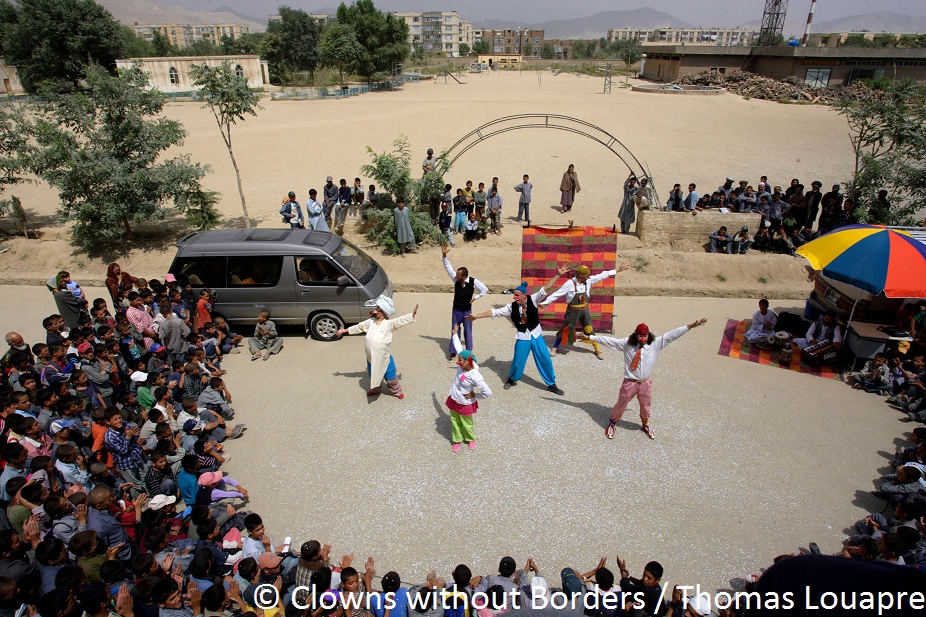 Sébastien Bris: The artists derive a great deal of satisfaction from their performances, from the enjoyment of the audience which is hugely rewarding. Moreover, the children for whom our troupe performs don’t know very much, if anything, about traditional theater or other kinds of performances. The artists are performing for an uninitiated public, a novice public. Whereas in France, for example, the audience already has preconceptions and expectations; they’ve developed a sense of critical thinking, which is very good in one sense but, in another sense, it prevents a totally fresh perspective. With the children we work with, on the other hand, it’s totally different. Everything is new for them and the performers also feel a greater sense of creative freedom.
Sébastien Bris: The artists derive a great deal of satisfaction from their performances, from the enjoyment of the audience which is hugely rewarding. Moreover, the children for whom our troupe performs don’t know very much, if anything, about traditional theater or other kinds of performances. The artists are performing for an uninitiated public, a novice public. Whereas in France, for example, the audience already has preconceptions and expectations; they’ve developed a sense of critical thinking, which is very good in one sense but, in another sense, it prevents a totally fresh perspective. With the children we work with, on the other hand, it’s totally different. Everything is new for them and the performers also feel a greater sense of creative freedom.
There’s also the satisfaction derived from the geographical locations of our performances. How many French performers get to perform in the Sahara desert? Or at the National Theater in Kabul? Despite the risks, it is deeply rewarding to perform on the streets of a country living under a dictatorship.
And of course, the really satisfying part of our work is the children’s enjoyment; seeing their smiles. In India, we were conducting workshops and we met one child who was particularly shy and reserved. Our workshop activities really helped the child to open up and that was wonderful to observe. Often, when the artists work with children, the children are really responsive.
In terms of an “exchange”, it’s really the cultural exchange that matters most. Our shows can take many forms. They’re multicultural, original and unique. Moreover, the performers don’t have much time to rehearse; they only have a few days to get ready. Yet, even in a very short time, we can achieve extraordinary results. In Myanmar, we drew on elements of Commedia dell’arte and traditional Burmese tales for our show. The masks we used weren’t commedia dell’arte masks but rather traditional Burmese masks. It was a particularly successful show and there were several performances. I laughed at every single one of them.
W4: Lastly, if you had to describe Clowns Without Borders in three words, what would they be?
Sébastien Bris: I would be inclined to use the tagline, “everything is possible…” I’d also say, “dreams” “laughter” and “joy”.
Agnès Comte: I’d say “solidarity,” “international,” and “cultural”—I think they’re the words that best describe our organization’s mission.
W4: Is there anything you’d like to add?
Sébastien Bris: Many people, when we first told them about our ambition to set up our project, said it would be impossible. And yet we’ve succeeded.
Agnès Comte: Support us and support the impossible!
Sébastien Bris: What we do generates good…
Learn more about Clowns Without Borders and/or make a donation to the organization.













